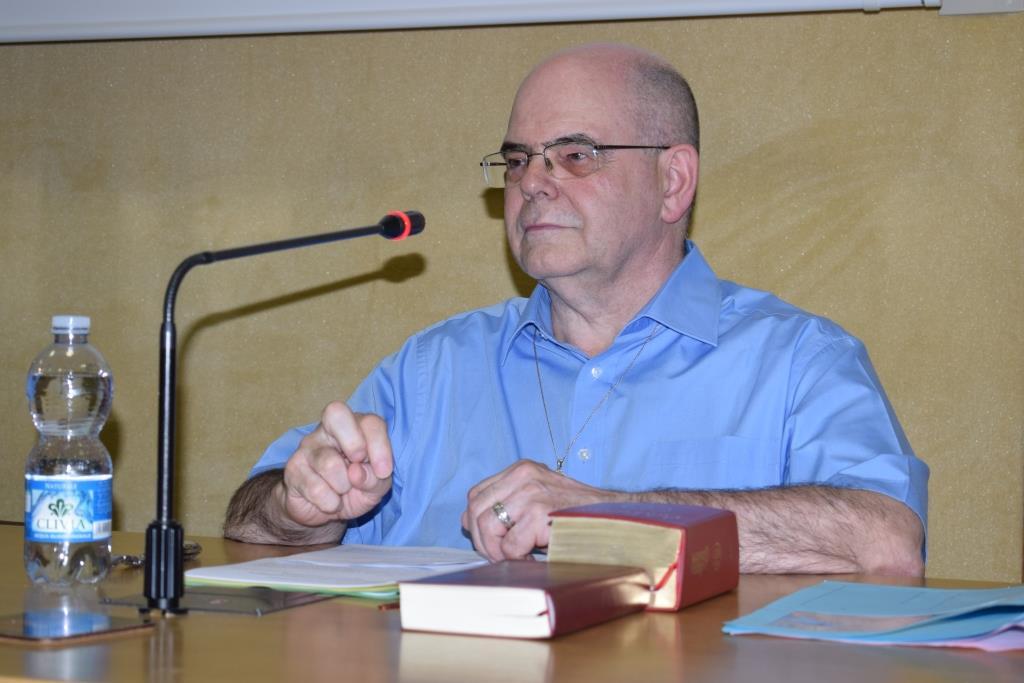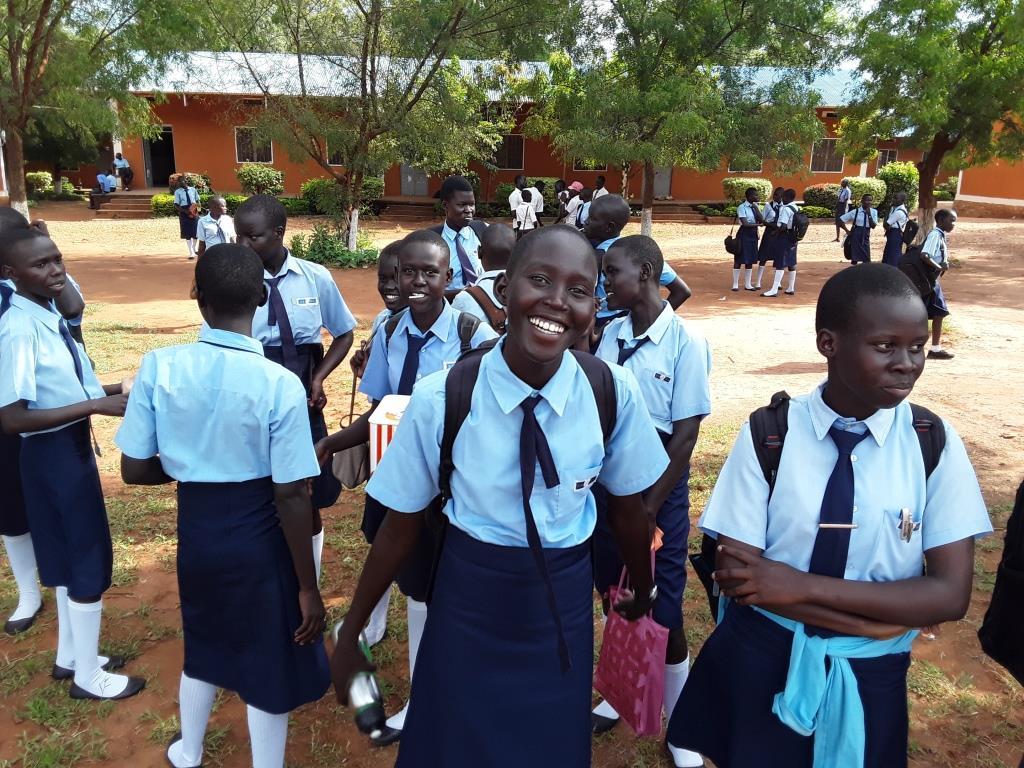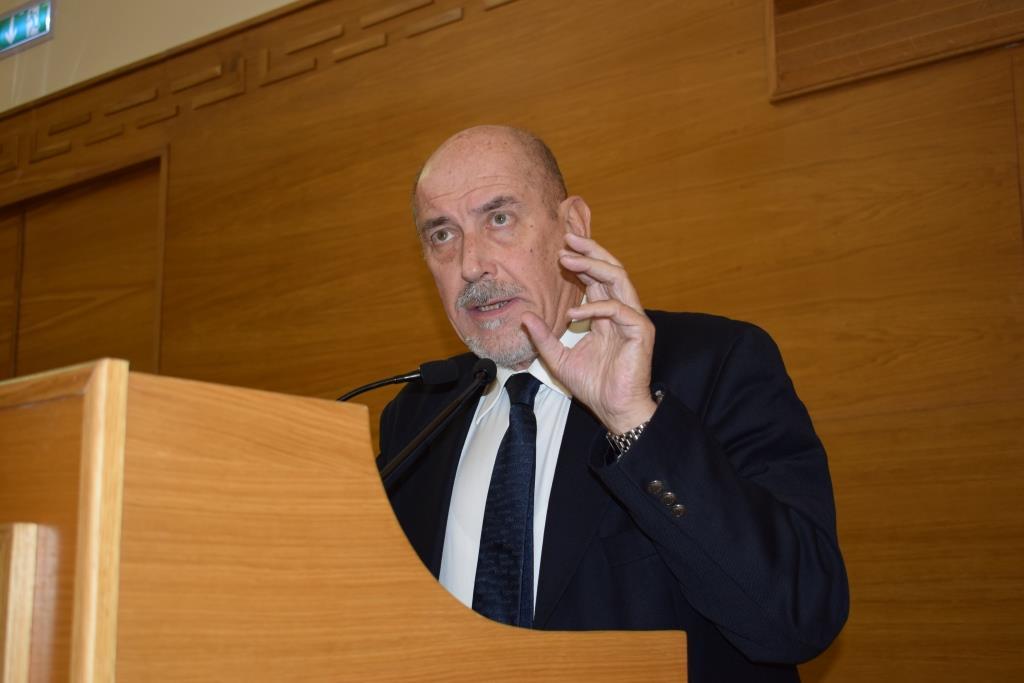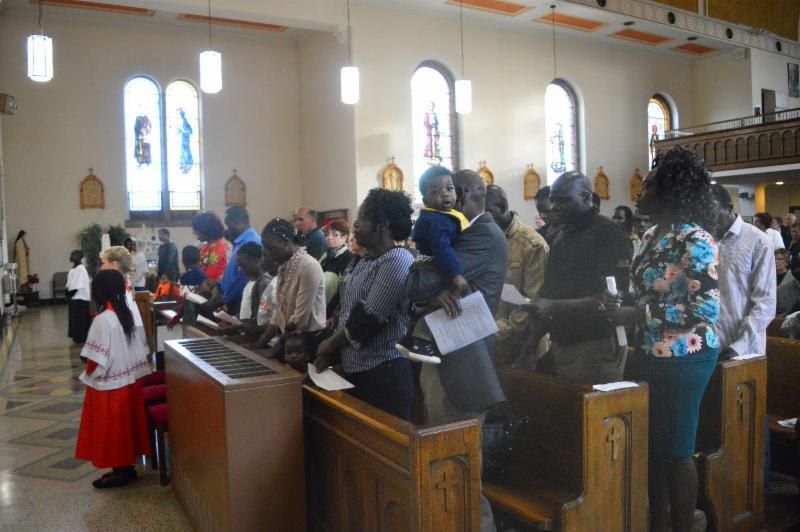Daniel Comboni
Comboni Missionaries
Institutional area
Other links
Newsletter
Tuesday, May 30, 2017
“As we celebrate 150 years since Daniel Comboni had the courage of founding his Institute, we can only wonder at the width, vitality and freshness of his vision. Once again, from the very beginning, he was clear, both in thought and action, that God had shared his mission with the whole Church, with every baptized person, and, in spite of the many difficulties he encountered, he pressed forward with this vision”, said Fr. David Kinnear Glenday yesterday, in Rome, at the Symposium for the 150th anniversary of the foundation of the Comboni Institute. Here is the text of the conference that Fr. David addressed to the participants in the Symposium.
Our ancient, deep, extraordinary vocation:
belonging as gratitude
Gratitude is a journey
Anniversary, celebration, remembrance, memory: all these things are readily and rightly associated with inspiring a sense of gratitude. Yet, at its most authentic, gratitude is more than a passing sentiment, more than a stirring emotion: at its deepest, gratitude is a journey, a discovery, a new beginning.
As Pope Francis has remarked: “the joy of the missionary always shines against the backdrop of a grateful memory”, because “a disciple is fundamentally someone who remembers”. Gratitude is not static, but dynamic; gratitude is movement - inwards, outwards, and forward. And mission is truly a journey into gratitude.
Beginning from love
Gratitude, in the first place, means to know – in the deep, rich and biblical sense of knowing – that the deep-down meaning of everything is love, or, as Cardinal Carlo Martini once memorably put it:
Everything has a meaning, and this meaning is luminous and life-giving. In other words, despite the darkness of humanity’s current circumstances, despite the human tragedy surrounding us, despite the trials of the Church and the well-nigh absurd situations through which the world and we ourselves have to pass, at the bottom of everything there lives a Gospel, a Gospel which assures us that that there is indeed a luminous and life-giving reason for all these things, if only we know how to grasp it and let ourselves be transformed by it.
This is gratitude’s first challenge: to let myself be led to the experienced conviction that the key which unlocks the mystery of existence is Grace, and that Grace is present in history - in our/my story – as Providence. Grace is active and at work, always; Grace searches us out, and waits for us to catch up; Grace never loses hope in us, and is always ready to begin again; Grace always grows, and always has dreams for our future. “For I know the plans I have for you," declares the Lord, "plans to prosper you and not to harm you, plans to give you hope and a future” (Jeremiah 29, 11). Grace always hopes, because Grace believes in us.
So to be grateful effectively means to re-read our history and our stories: How, where, by whom have I been loved? What has been the name, the face, of love for me, for us? How has Grace made it possible for me, too, to love? In this sense, the journey of gratitude will perhaps often mean surprise and unexpectedness, a whole new and different way of seeing things.
The Spirit will remind you (John 14, 25)
I find something very encouraging about the fact that Jesus foresees that his disciples are likely to forget what he has said while with them, and that he knows his Father will send the Spirit to help them with this amnesia of theirs. There is a powerful and consoling insight here: for the disciples, for us, remembering is in the first place not an effort or project of our own, but a gift, a grace, a work, of the Spirit. 150 years of my Institute, 40 years a priest: to keep an anniversary is not in the first place something we do for ourselves, but rather something the Spirit does in us and with us: in the end, the one who really remembers is the Spirit. And this means that remembering, when thus rooted and founded, is likely to trigger fresh discovery and surprise.
Each of us individually, and all of us together, can experience this gift of Spirit-led remembering. For my part, recently I have sensed that this grace has been offered me in two distinct and rather beautiful ways.
First, I have been, as it were, brought to remember times, situations, encounters, circumstances of life, that for many years I had simply forgotten. Now, as they come once again and unexpectedly to mind, they become new and deeper reasons to be grateful, to say, perhaps even to sing: the Lord was in that place, at that time, in those persons. It is as if the Spirit – precisely as Jesus promised – leads us to hear the word of love that Jesus was saying to us long ago in those experiences. There is an exciting challenge here: discovering in this way how great is the potential of our personal and community history, to treasure, cherish and re-visit that history in ever renewed hope and expectation.
Second, I have noticed the Spirit nudging me not only to re-call apparently forgotten times and experiences, but also to re-read only too well remembered experiences in a new way. Times until now read as times of hurt emerge as times of healing; times of fragility are revealed as places of mercy and wisdom; times of fault are recognized as places of joy: felix culpa, happy fault, fortunate fall; times of sin as times of forgiveness and growth in compassion. In Gospel terms, to remember is to be transformed.
Had I not been awake…
The first line of the first poem in Irish poet Seamus Heaney’s last book of poems runs like this:
Had I not been awake I would have missed it…
The poem, written after Heaney had suffered a severe stroke is, we might say, a hymn to attentiveness. The sudden and unexpected experience of serious physical fragility had brought Heaney to a new and deeper appreciation of the preciousness and beauty of being alive, and this had made him more attentive to the power of life in the present moment.
So true gratitude is never mere nostalgia, a hankering after the old days: true gratitude heightens my awareness of and deep respect for the present moment, so as to discover and cherish there the seeds of the future. A grateful person will tend to be a person willing to accept the challenge of discernment, very likely identifying with some of the things Pope Francis shared when he met the superiors general in November 2016:
I am very keen on the theme of discernment… We are used to formulas, to black and white, but not to the gray areas of life. And what counts is life, not the formulas. We need to grow in discernment. The logic of black and white can bring casuistic abstraction. Instead, discernment means going beyond the gray of life in a search for the will of God. And you look for the will of God following the true doctrine of the Gospel and not in the fixations of an abstract doctrine… This is the key point: discernment is always dynamic, as is life. Static things don’t work… So two words: listening and movement. This is important.
Or, in Heaney’s terms, gratitude means staying awake - and so not missing the movement of new life.
How can I thank the Lord?
Given all this, it comes as no surprise to find that gratitude in the end turns into mission, that thankfulness lies at the heart of every authentic outreach to others. Gratitude sends us out, urges us into the future, rekindles the dream, challenges to commitment, makes giving joyful.
Mission as gratitude enacted is a recurring and ultimately delightful theme in the lives of many outstanding missionaries. Paul, for example, could write to the Corinthians:
Blessed be the God and Father of our Lord Jesus Christ, the Father of mercies and God of all comfort, who comforts us in all our affliction, so that we may be able to comfort those who are in any affliction, with the comfort with which we ourselves are comforted by God (2 Cor 1, 3-4).
At the end of his Spiritual Exercises, Ignatius of Loyola invites the retreatant:
To ask for an intimate knowledge of the many blessings received, that filled with gratitude for all, I may in all things love and serve the Divine Majesty (233).
My own founder, St Daniel Comboni, writing from the desert on his way to his mission in the Sudan was able to say:
There is another month and a half to go before I reach my main residence at Khartoum. On top of all this, to carry a load for twenty camels, we need forty, because in their present condition camels carry less and for every forty, ten die. Moreover, there are only very few camels to be found. I am in the worst straits in the world: double effort, double expense, double danger and double uncertainty. I am writing to you under a big acacia which is at present our palatial residence. Ten paces from the packing case on which I am writing, the temperature is 45 degrees and we are only half way through March. But what can we do? This is our situation.
My Missionaries, my five Sisters (they are real angels), my craftsmen and I are the happiest people on earth because we are all in the hands of God, of Mary and of good St Joseph. We suffer for Jesus and we have all abandoned ourselves to the hands of God’s Providence. Really it is wonderful to suffer with Jesus, for Jesus and for the souls we must win for Jesus Christ!
Setting out again
So then, mission: a journey from gratitude into gratitude, a place where praise is discovered ever anew, in the folds of real life, with all its beauty, challenge and opportunities to begin afresh. Or, as St Augustine urged his people in his famous Easter homily:
Brothers and sisters, see that your praise comes from your whole being; in other words, see that you praise God not with your lips and voices alone, but with your minds, your lives and all your actions.
Against this background, it becomes natural for me to say that to celebrate the 150th anniversary of Daniel Comboni’s foundation of his missionary Institute cannot but be something deeply personal, the celebration of a multi-faceted grace that has accompanied me from my earliest years, and that I have grown to appreciate and comprehend in the different events and stages of my missionary journey. For me, this celebration is about gratitude, my gratitude to St Daniel Comboni, for the ways the Institute founded by him has so deeply shaped and enriched my life.
So let me share just three of my many reasons for this gratitude.
An experience of God
In his Plan for the Regeneration of Africa, Daniel Comboni makes it very clear that he lives his mission, and all the initiatives this mission leads him to take, as a sharing in the mission of God. Reflecting and praying on his first, deeply painful experience of mission in Central Africa, he discovers that there, in the midst of the loss and apparent failure, he has in fact come to know the Living God, a God-in-community and a God on mission, a God who goes out to the ends of the earth, and takes us with him, if we let him.
This is surely why, when Comboni comes to found his Institute, he envisions it in terms of a “little Cenacle”, a present-day Pentecost, a place where human beings are drawn into the missionary mystery of the Trinity. This is why the true life of this Institute is a life in the Spirit, and why a proper way to celebrate these 150 years is to say: the best is yet to come. This is why it may well be that the fragilities and limitations of the Institute today, rather than being obstacles to mission, may be the way to discover where and how the Spirit is leading us into the future. In other words, this celebration is just as much about the future as the past.
This Work is Catholic
I was born in India, of Irish mother and Scottish father, and so I suppose it is not strange that I should be especially grateful for the fact that St Daniel Comboni, from the very beginning, intended his Institute to be entirely international, or “Catholic” as he liked to say. The God he had discovered and experienced was a God for the whole world, involving the whole Church in a mission directed to every continent , nation, language and culture. Only by being open to members from every nation could this Institute, Comboni clearly felt and understood, be an effective and credible witness to the mission of God in the world.
This path has not been, and never will be, an easy one for us Comboni Missionaries, and we have had our struggles and failures along the way, but there is something very beautiful about the fact that in the end we have always been drawn back, at times despite ourselves, to this desire and intuition of our Founder. Deep in our hearts, we know what we are called to be: a little seed in the world of the family the Father longs for and desires.
Needless to say, I am deeply grateful that, thanks to so many Comboni Missionaries, I have been given the grace and opportunity of belonging to this Institute, a grace and opportunity I undoubtedly owe to the Founder’s intuition and vision.
A mission for every disciple
As we celebrate 150 years since Daniel Comboni had the courage of founding his Institute, we can only wonder at the width, vitality and freshness of his vision. Once again, from the very beginning, he was clear, both in thought and action, that God had shared his mission with the whole Church, with every baptized person, and, in spite of the many difficulties he encountered, he pressed forward with this vision.
Every bishop, he stressed, was called and ordained to accept responsibility for the evangelization of the whole world, and not just of his own diocese – and so he went to the First Vatican Council seeking to convince the bishops of this. His Institute was not to be composed only of priests, but also of laymen totally dedicated to mission – the “Brothers” who have made such a rich contribution to these 150 years, and without whom this Institute would not be Comboni’s. Within the same dynamic, Daniel Comboni involved women in mission from the start and went on to found the Institute of his Sisters – the two Institutes are two lungs of the same body, and the whole can only breathe and live well when this truth is lived in the daily practice of Comboni’s mission. The Founder reached out to laypeople, again both men and women, to other missionary Institutes and groups, to communities of contemplative Sisters: before being theory, this was for him the reality of mission, a reality that continues to challenge and provoke.
In the same direction, a particularly beautiful and evocative aspect of St Daniel Comboni’s foundation of our Institute are the relationships, the friendships, he lived with so many of the outstanding missionary figures of his time: with St John Bosco, with St Arnold Jansen, founder of the Divine Word Missionaries, with Fr Jules Chevalier, founder of the Sacred Heart Missionaries, and so on. Here, too, to celebrate these 150 years challenges us and points us forward towards the future.
Thank you, and yes
As Pope Francis says towards the beginning of his Evangelii Gaudium, the joy of the evangelizer always shines against the backdrop of grateful memory. It is this joy, and this kind of memory, that fills me and enthuses me even more today than when I first “met” Daniel Comboni, the Founder, so many years ago. Put simply, I am glad that this holy missionary did what he did.
Fr. David Kinnear Glenday MCCJ





